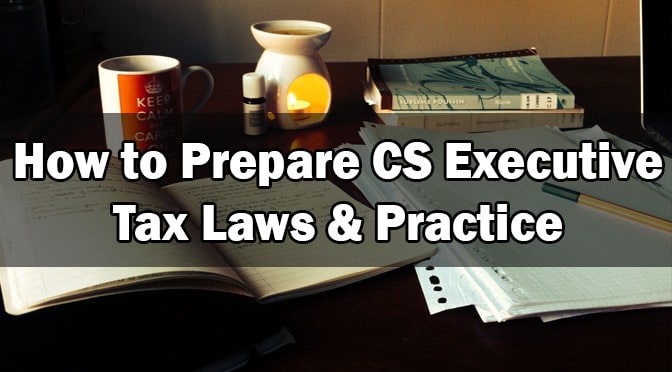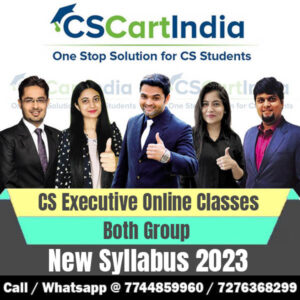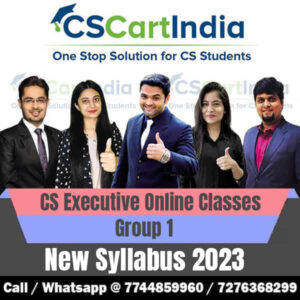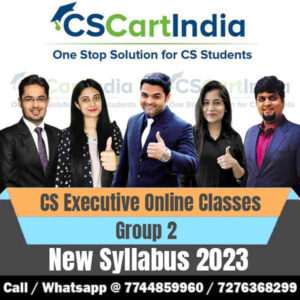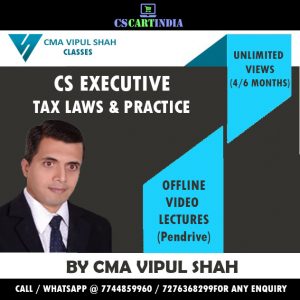How to Prepare CS Executive Tax Laws
In the previous post, we have given CS Executive Tax Laws and Practice Important Chapters. Today we are providing important tips in Preparation of CS Executive Tax Laws and Practice.As students are well aware that this subject is MCQ based, it is completely impossible to predict the Question paper. Various questions are asked from different areas of Taxation. In this Article we will highlight the core Strategy which every student should keep in mind while preparing for this paper very well.This post contains important tips and study plan for CS Executive Tax Laws which should not be missed by students.Scroll Down
Income-tax is a direct tax i.e., it is a tax levied directly on the income of a person. Income-tax, at the CS Executive level, largely involves an application of provisions of the Income-tax Act, 1961 to solve computational problems, and, is, therefore, a very interesting, and at the same time, a dynamic subject, on account of the major changes which take place in the income-tax law every year.
Since the subject of income-tax is new to you, it is essential that you need to have an idea of the constituents or elements which make up the income-tax law. You also need to understand the basic concepts, especially, the concept of “income”, on which tax is levied under this Act. The concepts of “assessment year” and “previous year” are equally imperative. Most importantly, you need to comprehend the manner of computation of total income, on which income-tax is levied.
Best CS Executive New Syllabus Video Lectures Combos
We have made an attempt to explain the above in the ensuing paragraphs in order to enable you to have a broad understanding of the constituents of income-tax law, the fundamental concepts and the manner of determination of total income and tax liability. Thereafter, you would be able to appreciate the scope of syllabus of this subject at the CS Executive Course level.
How to Prepare CS Executive Tax Laws : Point 1 – Be acquainted with the elements or constituents of income-tax law
The income-tax law, which governs the levy of income-tax in India, has the following elements or constituents –
- Income-tax Act, 1961
- Income-tax Rules, 1962
- Annual Finance Act
- Circulars/Notifications
How to Prepare CS Executive Tax Laws : Point 2 – Understand the fundamental concepts of income-tax law
Concept of “income”
Concept of “Previous Year” & “Assessment Year”
Concept of “person”
Concept of “assessee”
Best CS Executive Tax Laws Video Lectures
How to Prepare CS Executive Tax Laws : Point 3 – Understand the process of computation of total income and tax liability
Income-tax is a tax levied on the total income of the previous year of every person. The levy of income-tax is, therefore, on the total income of the assessee. The total income has to be computed as per the provisions of the Income-tax Act, 1961 in the following manner –
- Ascertain residential status
- Exclude income which do not form part of total income
- Identify & Group income under the respective head
- Compute the income under each head
- Apply clubbing provisions
- Give effect to the provisions for set-off and carry forward and set-off of losses
- Determine the gross total income (GTI)
- Allow deductions permissible from gross total income
- Find out the total income
- Calculate the tax liability (apply the rates of tax on the total income)
- Reduce tax deducted at source (TDS) and advance tax to arrive at the net tax liability
- Return of Income
How to Prepare CS Executive Tax Laws : Point 4 – Know your syllabus and expected level of knowledge
Having understood the basics of income-tax law, it is important that you are aware of the scope of syllabus and the level of knowledge expected so that you can plan your study accordingly.
The syllabus of Part – I: Income-tax of CS Executive Course: Taxation comprises of –
- Important definitions in the Income-tax Act, 1961,
- Basis of charge, rates of taxes applicable for different types of assessees,
- Concepts of previous year and assessment year,
- Residential status and scope of total income,
- Incomes which do not form part of total income,
- Heads of income and the provisions governing computation of income under different heads,
- Income of other persons included in assessee’s total income,
- Aggregation of income, set-off or carry forward and set-off of losses,
- Deductions from gross total income,
- Computation of total income and tax liability; rebates and reliefs,
- Provisions concerning advance tax and tax deduction at source and Working knowledge of the above topics is required at the CS Executive Level .
You are expected to gain knowledge of the provisions of income-tax law related to the topics mentioned above and also gain ability to solve simple problems concerning assessees with the status of individual covering the areas mentioned in the above paragraph.
CS Executive Super Saver Combos
How to Prepare CS Executive Tax Laws : Point 5 – Be informed of the Finance Act and Assessment Year relevant for your examination
The Finance Act of a particular year would be applicable for the June and December examinations of the next year. For instance, the amendments made by the Finance (No. 2) Act, 2017 would be applicable for June 2018 and December 2018 examinations. The relevant assessment year for June 2018 and December 2018 examinations is, therefore, A.Y. 2018-19.
You are expected to be updated with the notifications, circulars and other legislative amendments made upto 6 months prior to the examination. For June examination, such amendments made upto 31st December of the previous year would be relevant and for December examination, such amendments made upto 30th June of that year would be relevant.
How to Prepare CS Executive Tax Laws : Point 6 – Draw up a detailed study plan and allocate time for each topic/chapter of the subject
Preparing a comprehensive study time table well in advance would be of great help in organizing your study in an effective manner. In fact, you should start your study immediately after passing your CS Foundation examination and registering for CS Executive Course. Ideally, you should allocate at least 3 to 4 hours every day for the subject of income-tax. Utilise your study period effectively.
The next step is to estimate the time to be allocated for each topic/chapter of the subject. The scope of syllabus, the contents of each chapter in the Study Material and Practice Manual would help you to broadly assess the time which each topic of the subject would consume. Of course, since the subject of income-tax is new to you, you have to keep some percentage margin over and above the time assessed by you to take care of possible difficulty in understanding new concepts, particularly relating to business taxation, capital gains and provisions concerning deduction of tax at source.
Best Selling CS Executive Video Lectures Combo
How to Prepare CS Executive Tax Laws : Point 7 – Make full use of all the knowledge inputs of ICSI
The ICSI brings out various publications from time to time with a view to assisting the students in education. You are advised to make full use of the Study Material and other educational inputs provided to you. These educational inputs are also available under Academic Corner of the Institute’s website. Some of the important publications of ICSI in the area of Income-tax are:
| ICSI Material & Objective | Key Features |
| Study Material
The aim of the Study Material is to build a strong conceptual base by explaining the complex income-tax law in an easy way |
●The chapters are organised in a logical sequence for clear comprehension; ● The provisions of income-tax law have been explained in a lucid manner to facilitate easy understanding; ●Illustrations have been given, wherever possible, to explain the provisions of income-tax law; ●The latest amendments have been given in bold italics; ●The Circulars/Notifications issued by the CBDT have been discussed along with the respective sections to which they |
| Supplementary Study Paper
This is a very important knowledge input in the area of taxation explaining the amendments made by the relevant Finance Act and latest circulars and notifications issued by CBDT. |
●The Supplementary Study Paper is also divided into chapters so that you can co-relate the same with the Study Material;
●Illustrations have been given, wherever possible, for better understanding of the amendments;
●Related sections are grouped together and explained to facilitate interlinking and reading of interconnected provisions;
●In respect of each notification, the relevant provision of the Act which confers the power to issue such notification is described briefly, so that you can relate the notification to the appropriate provisions of the Act
●The questions from past Test Papers etc. are also included;
●The questions are adapted as per the provisions of income-tax law as amended by the latest relevant Finance Act;
●Answers to the questions are based on the provisions of income-tax law as amended by the latest relevant Finance Act;
●For example, in the latest edition of the Practice Manual, the questions and answers are based on the provisions of income-tax law as amended by the Finance (No. 2) Act and are hence, relevant for June and December examination.
●Key points are given at the beginning of each chapter to facilitate quick revision;
●Self-examination questions are added at the end of each chapter to test your understanding of the concepts explained in the corresponding chapter of the Study Material. |
| Test Papers (White Book available at ICSI Chapter Office) The Test Papers are prepared with the twin objective of –
●Updating you on the latest developments on the statutory front. ●helping you to self- assess the effectiveness of your study and revision by solving the questions given independently and comparing the same with the answers given. |
●The questions in are framed to test your awareness and understanding of the provisions of income-tax law forming part of the syllabus for CS Executive Course |
| Suggested Answers
As the name depicts, this publication contains the questions set at the CS examination, as well as the suggested answers to such questions. |
●The answers are prepared with a view to assisting the students in education;
●The suggested answers generally represent the ideal manner in which questions should be answered;
●Therefore, it contains references to sections (including sub-sections and clauses), notifications and circulars issued by the CBDT;
●In solutions to computational problems, the reasons for treatment of items are explained by way of Notes, giving reference to the related provisions of income-tax law |
How to Prepare CS Executive Tax Laws : Point 8 – Follow systematic study pattern
Ideally, for the subject of Income-tax, your study pattern should be in the following sequence as briefed in the table below –
| Steps in Preparation | Objective of study | Relevant Publication |
| Step I | Study each topic of your syllabus thoroughly for conceptual clarity | Study Material as amended by the Finance Act relevant for your examination. |
| Step II | After you complete study of a chapter in the Study Material, update yourself by going through the amendments by the Finance Act relevant for your examination and recent Notifications and Circulars issued by CBDT relating to that chapter | Supplementary Study Paper |
| Step III |
Work out the problems and solve the questions after completing a study of each chapter in the Study Material to test your level of understanding of concepts explained in the said chapter. Note – After you complete study of the entire syllabus content, solve all the problems in the Practice Manual once again to make sure there are no grey areas. Solving Full Questions as given in Study Material and Practice Manual will make your basics strong which will eventually help you in solving MCQ based Questions |
Test Papers |
| Step IV |
Update yourself with the latest developments on the statutory front and self-assess your preparation.Solve all the Past Question papers and evaluate with suggested answers by ICSI |
Suggested Answers |
| Step V |
Test your level of preparation by solving question papers within the given time frame of three hours and compare your answers with the answers published by the ICSI. You can also check your progress by solving the Mock Test Papers hosted by various coaching classes. Mock tests are also held at the various websites |
Mock Test Papers |
How to Prepare CS Executive Tax Laws : Step I – Study the “Study Material” to get your concepts clear
Be clear with the concepts
Ideally, when you take up any topic for study, you must first go through the relevant chapter of the Study Material for building a strong conceptual base. Make sure you read the Study Material updated on the basis of the provisions of income-tax law as amended by the Finance Act relevant for your examination. In case you have the earlier edition of the Study Material, then, you must go through the Supplementary Study Paper, which explains the amendments made by the Finance Act relevant for your examination.
Try to remember important sections
You should make it a habit to read the tax provisions along with the relevant sections so that you are able to relate the provisions of law, circulars and notifications with the respective sections. At least, try to remember :
- the charging sections under each head, namely, section 15, 22, 28, 45 and 56;
- the sections containing exemption provisions, namely, section 10, 54,54B, 54EC, 54F ,
- Important deductions under each head, like, sections 16, 24, 32, 36, 37, 57 , and
- deductions from gross total income, like, deductions under section 80C, 80CCC, 80D, 80E, 80G, 80GG ; You would not be tested on court rulings at the Intermediate (IPC)
Jot down key points for easy revision
Make it a habit to jot down the key points including formulae, if any, in each topic, and particularly, in your problem areas. This would facilitate revision, especially when you have a limited time of just one day before each examination.
Read the related provisions together
While reading the chapters in the Study Material, you should keep in mind that each chapter cannot be read on a stand-alone basis. Moreover, for a proper appreciation of the income-tax law, inter-linking and combined reading of sections is an essential pre-requisite. The provisions contained in a chapter, say, Chapter on “Computation of total income and tax liability”, have to be read along with the provisions relating to heads of income, incomes which do not form part of total income, clubbing provisions, set-off and carry forward of losses and deductions from gross total income, which are discussed in separate chapters of the Study Material, to compute the total income and tax liability of an individual.
CS Executive All Law Subjects Video Lectures by CS N K Singh
How to Prepare CS Executive Tax Laws : Step II – Stay current with the “Supplementary Study Material”
An analysis of recent question papers has revealed that considerable stress is laid on recent amendments and developments. You are advised to update yourself with the help of Supplementary Study Paper which is brought out every year. In this publication, the amendments made in income-tax law by the Finance Act of that year are categorized chapter-wise and explained with the aid of illustrations and tabular presentations to facilitate easy understanding. Further, the latest notifications and circulars issued by the CBDT are also explained in the Supplementary Study Paper. Accordingly, the Supplementary Study Paper explains the amendments made by the Finance (No. 2) Act, and significant notifications and circulars.
You must carefully peruse the amendments explained in the Supplementary Study Paper and update yourself. The related sections are grouped together and discussed at one place in the Supplementary Study Paper and therefore, you would not face any difficulty in combined reading and understanding of the interconnected provisions.
Even if you have the latest Study Material, we would still advise you to go through the Supplementary Study Paper, since the amendments are discussed in detail herein. It would also help you understand and assimilate the recent amendments in a more effective manner.
How to Prepare CS Executive Tax Laws : Step III – Apply the concepts to solve practical problems in the Practice Manual
After reading each chapter in the Study Material and the corresponding chapter of the Supplementary Study Paper, try to work out the problems in the parallel chapter of the Practice Manual on your own, and thereafter compare your answers with the answers given therein. This would help you to identify your mistakes and also learn from your mistakes. Further, this process would help in revision of the concepts and principles contained in each chapter of the Study Material and application of the same while solving computation problems. The computation problems in the Practice Manual are worked out in detail, with working notes/notes, giving reference to the related provisions of income-tax law.
Once you complete study of all the topics in the syllabus, try solving the problems in the Practice Manual once again to test if you are clear with all the concepts or whether there are still many grey areas which require further understanding.
Only after Completing Full problems from Study Material and Practice Manual, Start Solving MCQ’s.
How to Prepare CS Executive Tax Laws :Step IV – Update & Revise with the aid of the Test Series
Update yourself on the Statutory Front
Study Material is generally updated on the basis of the Finance Act of that year and notifications and circulars issued up to 30th April of that year. The Study Material, so updated, would be relevant for June and December Examination in the following year. However, for the June examination to be held in the following year, the significant notifications and circulars issued up to 31st December of the previous year are relevant. The Test Papers for June examination, therefore, contains the significant notifications and circulars.Likewise, for the December examination of the following year, the significant notifications and circulars issued up to 30th June of that year are relevant. The Test Papers for December examination would, therefore, contain the significant circulars and notifications.
Revise what you have learnt
Solving the questions and problems in the Revision Test Papers (White Book) and comparing the same with the answers given would help you to self-assess the effectiveness of your study and revision.
Best CS Executive Tax Laws Video Lectures
How to Prepare CS Executive Tax Laws : Step V – Check your level of preparation
Solve past years’ question papers and compare with Suggested Answers
You should also make an honest attempt to solve the immediately preceding examination papers within a time span of three hours and compare your answers with the Suggested Answers published by the ICSI. This will help you to identify the areas where you are deficient and enable you to take corrective steps to avoid such mistakes in your examination.
However, remember that Suggested Answers are prepared on the basis of the provisions applicable for the assessment year relevant for that particular examination. Therefore, while checking your answers with the answers given in the Suggested Answers, you should keep in mind that your answer would vary to the extent of amendments made by the Finance (No. 2) Act and notifications and circulars issued after
Solve Mock Test Papers
You may also try attempting Mock Test Papers hosted by Various Coaching classes to complete the process of revision. You can also appear for the Mock Tests conducted by Various websites.
How to Prepare CS Executive Tax Laws : Point VI – Face the examination with confidence
Having prepared well for the examination, it is also important that you approach the examination with a positive attitude. Do keep in mind the following points to score well in this paper :
(I) Answer the questions with a due emphasis on provisions of the income-tax law – Derive your answers/conclusions with proper reasoning. Answers should be based on relevant legal provisions rather than a mere common sense and/or guesswork.
- Try to remember relevant section numbers – Remembering section numbers would definitely add value to your However, it is better to remember it correctly and properly.
- Make short forms while studying – Use of short forms while making short notes should be done properly.
- First, answer the question which you know best – This will boost your confidence while attempting the remaining questions and create a positive impression of your level of
- Follow instructions given on the cover page of answer paper- Pay heed to the instructions given on the cover page of the answer
Best CS Executive Tax Laws Video Lectures
How to Prepare CS Executive Tax Laws : PART II: INDIRECT TAXES
Indirect taxes play a pivotal role in the national economy as the central and state indirect taxes cumulatively contribute to more than 50% of the total tax revenue of the country. Being a major source of revenue, fiscal legislations lay a greater emphasis on levy of indirect taxes.
Students are introduced to GST at CS Executive Level in Part II: Indirect Taxes of Paper 4: Taxation. At this level, you are expected to develop an understanding of the basic concepts of the GST and acquire the ability to analyse the significant provisions of GST. Since the subject is totally new to you, you will have to first develop an understanding of the basic concepts. Furthermore, preparing this paper in a planned manner by drawing an effective Study Schedule is utmost essential. Therefore, the following procedure is recommended for the preparation of Part II: Indirect Taxes of Paper 4 Taxation (hereinafter referred to as “Part-II: Indirect Taxes”):
How to Prepare CS Executive Tax Laws : Step – 1: Know your syllabus
(i) First and the foremost, you should go through the syllabus of the paper carefully. The objective of the syllabus is to develop an understanding of the basic concepts of the different types of indirect taxes and to acquire the ability to analyse the significant provisions of service tax.
|
How to Prepare CS Executive Tax Laws : Lesson 16 |
|
GST is a major milestone in tax reforms in Independent India.GST is a common and unified tax on goods and services. It is a destination based consumption tax. It is applicable all over India including Jammu & Kashmir_ It adorns dual taxation model where union and states levy and collect taxes simultaneously_ It ensures seamless flow of input tax credit to a large extent It has been designed to be 100% online_ A giant portal called GSTN is being used to ensure working of the GST system. A high powered federal body called GST Council has been established under Article 279A of the Constitution of India to decide policy matters, formulate principles for administration and implementation of GST_ Constitutional amendment was necessary to enable centre and states to levy GST simultaneously. At the end of this lesson, you will be able to learn : — What is GST — What are the constitutional amendments required to roll out GST — What is the existing system of Indirect Taxation — Evolution of Indirect Taxation in India — Administrative Mechanism — Overview of previous Indirect Taxation |
|
How to Prepare CS Executive Tax Laws : Lesson 17 An Overview of Goods and Services Tax Law |
|
At the and of the chapter_ you will be able to — GST models in the world and why Dual GST has been adopted for India — Administrative set up, appointment and powers of the staff — Benefits and features of CST — Classification of Goods and Services Reverse charge mechanism — Rates of Taxes Supply is the taxable event under the scope of supply has been given under Section I of the COST Act, 2017_ Taxable event means an event or situation which gives rise to liability The Paw declared special scheme called composition levy under the Act. Under this scheme only turnover tax is payable but Input Tax Credit is not allowed on inward supplies. Time of supply signifies the point of levy and value. of supply determines value on which GST is payable_ At the end of this lesson, you will be able to learn — — Various definitions are given in The Act — The nature and scope of supply — Composite and mixed supply — Levy and Composition levy of supply and — Value of supply |
|
How to Prepare CS Executive Tax Laws : Lesson 18 |
| When a tax at output level is nil, it is called exemption. When a tax at bath input and output level is nil, is called Zero tax. Tax paid at input Mere! is called input tax and credit of which is called input tax credit (ITC).ITC is available on inward supplies and it is available even on goods sent on job work. Input service distributor fin) is also allowed to distribute ITC on input services to its other registered units on certain terms and conditions.Where a recipient of supplies is directly liable to pay tax, he is said to be paying tax under reverse charge.
At the end of this lesson, you will learn about — Exemptions under GST — Input tax credit — ITC where goods are sent on job work — Distribution of ITC by ID — Computation GST And matters incidental thereto |
|
How to Prepare CS Executive Tax Laws :Lesson 19 |
|
Under the GST system, the filing of return is linked with payment of tax. Return cannot be filed with payment of tax. Return cannot be filed without payment of tax. Without filing the previous return, a current return cannot be tiled.Waybill system has been removed.E-way bill has been introduced.. it has to be generated through a common portal. It is essential for the movement of goods valued above Rs_ 50,000 1-. At the end of the chapter, you should be able to learn ■ Details regarding registration ■ The records and accounts to be maintained ■ Tax invoice, credit and debit note ■ Returns Assessment and payment of tax ■ Refunds and audit ■ Electronic waybill |
|
How to Prepare CS Executive Tax Laws : Lesson 20 |
|
In India, we have adopted dual GST Model in which States and union Government impose tax simultaneously. The federal structure of the constitution is also retained under this model.To ensure seamless flow of credit throughout the territory of India a tink Act is necessary and hence IGST Act, 2017 has been passed_Compensation to states for the loss due to the introduction of GST is provided through an Act.GST (Compensation to States) Act, 2017. At the end of this lesson you will be able to learn about – – The provisions of IGST Act, in brief. — UTGST ACT and its working —GST (Compensation to State) A |
CS Executive Super Saver Combos
How to Prepare CS Executive Tax Laws : Step 1 – Make a comprehensive study plan
Planning your studies will definitely help in preparation of any paper. Making a detailed study plan with appropriate time allocation for all the topics will facilitate in completing your studies (along with revision) in time. Your planning for Part-II: GST, should be such that you go through the paper at least thrice before the examination.
Since in Part-II: GST, the examination paper has a mix of practical and theoretical questions, you should do practice of good number of both theory and practical questions on each topic. Therefore, at the time of planning the study, you should factor in the time for practice. Always remember that you will be able to reap the benefits of a study plan only if you stick to your daily targets. Following your daily schedule religiously will lead to completing your studies well in time. How to Prepare CS Executive Tax Laws
You may study at least two hours a day so that you are able to complete first round of entire study and two rounds of revision well before the examination. Your first round of study should be completed well in advance that is at least 3 months before your exam. This is a broad-based planning about how to study but you should also pay attention to specific time planning for each and every chapter in detail – when to start and by what time the chapter should be completed. Keep some extra time as the assimilation of the chapters may take more time than expected or planned.
Your second round of study i.e., your first revision should be over before one month of your exam. You should revise the second time in the last month before the exam so that you are in a position to remember all the concepts. These three rounds of study will help in boosting the confidence level for the subject and will make you mentally prepared to appear in the examination.
How to Prepare CS Executive Tax Laws : Step 2 – Start the study for Part-II: Indirect Taxes
■ You should go through each chapter meticulously to understand the concepts covered therein. A word of advice – keep the Bare Act and the Relevant Rules of the relevant statutes by your side when you read the Study Material. This way you will become conversant with the sections of the Bare Acts and the related Rules, and understand their implications properly.
■ Prepare short summaries of each chapter and try to include all the key points of the chapter in the said summary. These summaries would be very useful for quick revision at the time of
■ Work out practical problems from the corresponding chapter of Practice Manual after you complete the theory portion of a chapter from the Study. How to Prepare CS Executive Tax Laws
■ Even if you study from the latest Study Material you should go through the Supplementary Study Paper to update yourself with the amendments made by the Finance (No. 2) Act and the Notifications/Circulars issued during the last one While in the Study Material the amendments are incorporated at the relevant places without any significant discussion on the old provisions or the reason for introducing the amendments, the same are dealt in detail in the Supplementary Study Paper. Therefore, in order to get a complete understanding of the amendments, you are advised to go through the Supplementary Study Paper
■ Another thing to be kept in mind while studying for this paper is that indirect tax laws are amended very frequently by notifications and various circulars clarifying the position of law are issued from time to time.Therefore, you must pay due attention to the compilation of amendments.
■ Every day when you start a new topic, you should first go through the concepts which you have read last day and then start learning new Remember, out of sight, out of mind.
Best Selling CS Executive Video Lectures Combo
|
How to Prepare CS Executive Tax Laws : Special guidance for computational questions You should work out the computational problems from Practice Manual on your own and then compare it with the solutions provided therein. At the time of first practice, mark the problems which contain some difficult issues or the problems which you find important from the examination point of view. Moreover, summarize the treatment of the said issues and mention it at the end of that question with a marker pen. When you practice the same chapter subsequently, pay special attention to these marked questions. This will help you in preparing a gist of critical issues and their treatment. On the day before the examination, since it is not possible to solve all the computational questions in one day, going through the gist of these issues would suffice. |
How to Prepare CS Executive Tax Laws : Step 3 – Revision of examination and assessment of your preparation
As discussed earlier, you should complete two rounds of revision before your examination. You should go through the entire curriculum again during your first revision. This will facilitate the strengthening of concepts and will also lead to better retention of the various provisions. After you complete your first revision, you should go through the Statutory Update given in the Supplementary Study Material relevant for your examination. For assessing your preparation status after first revision, you should attempt solving the questions given in Test Papers on your own and then compare your answers with the answers given therein. The questions are an appropriate mix of amendments based questions, computational problems and theoretical questions involving application of provisions. Needless to say, after identifying the mistakes made by you while solving the questions, you should adjust your second revision plan appropriately to make time for strengthening those grey areas.
Your second round of revision should ideally start in the last month of the examination. After you finish the revision of the entire curriculum second time, you should once again check your preparation status with the help of Mock Test Paper of the Taxation. You should attempt the Mock Test Paper with sincerity as your performance in the Mock Test Paper will actually give you an insight of your preparation level.
How to Prepare CS Executive Tax Laws :Step – 4: The day before examination
On the day before examination, you should not go into much detail due to time constraints. Do not burn the midnight oil. Have adequate sleep. Just go through summary of each chapter and the treatment of significant issues.
Best CS Executive Tax Laws Video Lectures
Important Topics of CS Executive Exam
Here we are providing subject wise important topics to CS Executive students. See below How to prepare CS Executive Module – 1 and Module – 2. Click below links
Module – 1
CS Executive Cost and Management Accounting
CS Executive Economic and Commercial Laws
CS Executive Tax Laws and Practice
Module – 2
CS Executive Capital Market and Securities laws
CS Executive Company Accounts and Auditing Practices
CS Executive Industrial labour and General Laws
Article Name : How to Prepare CS Executive Tax Laws




